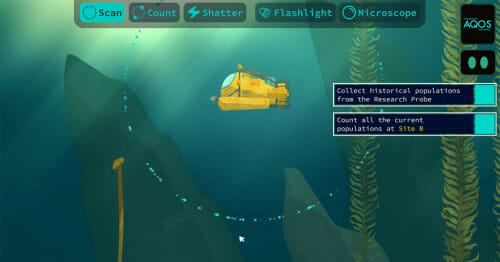Newest Field Day Lab educational video game is a deep dive
The most complex, in-depth educational video game ever produced by UW–Madison’s innovative Field Day Lab has been released for public use.
The game represents exciting new frontiers for game-based learning and a major achievement for the internationally-recognized lab.
It’s also the product of Field Day’s continued outreach to Wisconsin classrooms, both to brainstorm ideas when developing the games, as well as a place where the games are used to teach students.
Wake: Tales from the Aqualab is an immersive, life-sciences-focused game that aims to teach middle and high-school students about scientific research practices through an engaging narrative arc about a budding ocean floor research scientist — and the nightmares that plague her. The web-based game is now available for public use by teachers, educators, and families on BrainPOP, an educational games website, and PBS LearningMedia.

“Wake: Tales from the Aqualab” in action. Image courtesy of Field Day Lab
David Gagnon, director of Field Day Lab, which is based at the Wisconsin Center for Education Research at the UW–Madison School of Education, says Wake is the most ambitious game ever created by his team. Crafting the complex and creative game involved engineers, designers, educational researchers, 3D artists, 2D illustrators, a musician, and classroom teachers from across Wisconsin.
“I’m quite confident that Wake is one of a few projects of this size ever attempted,” Gagnon says. “The game has over 50 different challenges across a dozen ecosystems with hundreds of individual species, all numerically simulated.”
Sarah Gagnon, creative director at Field Day Lab, says the game includes an “immerse narrative arc” that aims to engage every student — even those who haven’t typically been interested in subjects like science, technology, engineering, or math.
“This is an important element to our design philosophy — to reach kids through their imagination,” Gagnon says. “The game includes experiments and all kinds of science, but it also includes a compelling story and dream sequences. We wanted to create a world that explores the wonderful and vast world of terrifying creatures in the deepest parts of the ocean.”
In the game, students conduct experiments such as gathering samples of oceanic flora and fauna and bringing them back to their lab for observation. As the game progresses, the experiments grow increasingly complex and players earn more experience points to “buy” additional equipment needed to complete more advanced inquiries.

“Wake: Tales from the Aqualab” has been released for public use. Photo by Sarah Maughan
Before long, students are troubleshooting snags in their experiments and building out scientific models. In all, the game can take up to eight to 10 hours to complete.
In addition to providing students a rich and immersive learning experience, Wake gameplay will also provide data to education researchers about how students are interacting with and learning from the game.
“This learning game is creating impact by filling an important gap in how science practice and modeling is taught, but it is also an important tool in building learning theory,” says Sarah Gagnon. “The game is powering our research into how people learn.”
Wake underwent months of development and testing before its public release — some of which involved direct feedback from Wisconsin teachers. Those teachers also helped develop supplemental classroom guidance and materials for other educators who want to incorporate Wake into their curriculum.
The game’s distributors, BrainPOP and PBS LearningMedia, say Wake is sure to make a big splash with students.
“Field Day has developed one of the deepest and most expansive science games we’ve seen yet, engaging students in experimentation, modeling, and more,” says Michael Gi of BrainPOP. “From the beautiful art design to the thought and care put into the characters and mechanics, this game brings a sense of fun and wonder to budding scientists everywhere.”
Pegeen Wright, director of digital learning at GBH Education, which co-manages PBS LearningMedia, lauded the game as “a captivating story with relatable characters.”
“We are looking forward to seeing how PBS LearningMedia teachers and students use this rich learning experience,” Wright said.
The game is available on BrainPOP here and PBS LearningMedia here.
Field Day also has a number of ongoing and future opportunities for collaboration with interested educators, subject matter experts and researchers in Wisconsin and beyond. Information about opportunities for educators is available here and subject matter experts is available here.
Subscribe to Wisconsin Ideas
Want more stories of the Wisconsin Idea in action? Sign-up for our monthly e-newsletter highlighting how Badgers are taking their education and research beyond the boundaries of the classroom to improve lives.
Tags: The Wisconsin Idea
